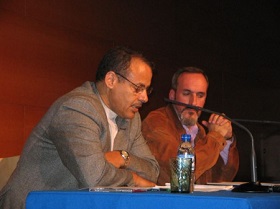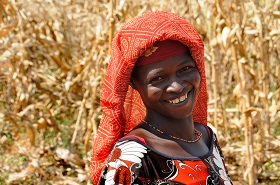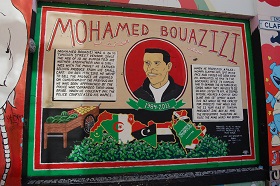Recently the RIAC team has met with Polisario representatives in Moscow. Mohammed Haddad, who represents Polisario’s cause through its Moscow mission, is a member of the movement’s leadership. He is in charge of the negotiation team, which started talks in 1986 with Morocco through the UN framework that led to the peace settlement of 1991. Mohammed Haddad has worked with consecutive personal envoys of the UN Secretary-General for Western Sahara - James Baker, Peter van Walsum and current Personal Envoy Christopher Ross. He also contributed to peace negotiations with Mauritania in 1979.
Recently the RIAC team has met with Polisario [1] representatives in Moscow. Mohammed Haddad, who represents Polisario’s cause through its Moscow mission, is a member of the movement’s leadership. He is in charge of the negotiation team, which started talks in 1986 with Morocco through the UN framework that led to the peace settlement of 1991. Mohammed Haddad has worked with consecutive personal envoys of the UN Secretary-General for Western Sahara - James Baker, Peter van Walsum and current Personal Envoy Christopher Ross. He also contributed to peace negotiations with Mauritania in 1979.
What are your main projects and activities?
I am the coordinator with MINURSO [United Nations Mission for the Referendum in Western Sahara created in 1991]. The first stage was securing the cease fire, which was settled on September 6, 1991. Unfortunately, since then there has been no progress because Morocco has persistently refused for the referendum to be held. Since 1991, I have been working with the UN mission in Western Sahara, first as the chief of what is called the Identification Commission, which has been charged with determining who is eligible to participate in the referendum. In 1996, I was appointed as the coordinating chief with the United Nations and with MINURSO on the ground. In the beginning it was about the identification of Western Sahara, then the ceasefire was to be achieved. Unfortunately, when the ceasefire was settled Morocco took a firm stance in the negotiations process and multiple criteria for identification had to be discussed in 1997. This is still a very pressing and painful issue to be settled.
Have the goals of Polisario front changed since the last century or not?
Western Sahara is an issue of decolonisation. It is on the UN list of non self-governing territories [along with 17 other small territories]. It has been since 1965 when the UN drew up a resolution calling for the decolonisation of Western Sahara, giving it the right for self-determination. We had to struggle again when the International Court of Justice issued an advisory opinion in 1975 saying that there were no sovereign links between Western Sahara and Morocco or between Western Sahara and Mauritania. Morocco totally ignored this advisory opinion, invaded our territory in conjunction with Mauritania and with support from Spain and France. What followed was a 16-year war which Morocco lost in 1991 and eventually agreed to a peace settlement. Since then there have been no major changes.
How do you see Russia’s role in resolving this problem?
Russia is not only one of the most important actors in the international relations but also a permanent member of the Security Council and a member of the Group of Friends of Western Sahara alongside US, UK, France and Spain. Spain is not a permanent member given its colonial background in Western Sahara. Russia can really make a difference by calling for the implementation of the Security Council resolution about Western Sahara. For the people of the region, Russia has always been a symbol of freedom and support for liberation movements. France, by contrast, symbolises occupation and colonialism.
During your stay in Moscow you were received by the Russian Ministry of Foreign Affairs. Are there any results of the meeting that you would like to share with us?
We had a very important discussion with President Putin’s special envoy about the situation in Western Sahara, the perspective of peace and what we expect from the Security Council when it holds its next meeting in April 2015. We have to break away from this stalemate. Since April 2014 Morocco has refused to cooperate with the United Nations and personally with envoy Christopher Ross. Morocco has only recently started to cooperate with them since January 2015, just before the Security Council meeting. Four decades have passed since Morocco engaged in war against Western Sahara, and time is not on the side of continuous armed conflict. Morocco failed to deliver a solution both on the military and on the diplomatic front because the international community does not recognize Moroccan sovereignty over Western Sahara.
The people of Western Sahara challenge Morocco daily, organising demonstrations against the occupation and calling for a peaceful democratic solution to the conflict. Western Sahara is a clear legal case where double-standard policies have no place. Hans Corell (the head of legal affairs at the UN, 1994-2004) published an advisory opinion in 2001 in which he said that “Even after Spain withdrew its troops in 1975 and gave the territory to Mauritania and Morocco, it does not mean that Morocco is an administrative power or has sovereignty over the territory”. He added that doing business with Morocco in Western Sahara is illegal because Western Sahara is a non self-governing territory. Thus it is impossible to do business on the territory without taking into account the views of the local population.
Do you also work with the African Union?
When the conflict started in 1975 the Organisation of African Unity explicitly stated that the matter in question related to two fundamental principles of Africa. Firstly, it concerns the respect of the borders established after colonial rule collapsed. Secondly, it touches upon the principle of self-determination. The Organisation of the African Unity [later replaced by the African Union] was actively involved in the settlement process of the conflict from 1975 to 1984. The organisation elaborated a peace plan, which Morocco refused to implement in 1984 [2] .
The African heads of state decided to accept the Sahrawi Republic as one of the founding members of the African Union. There are some countries, like France, that support the Moroccan point of view but not many. The Union supports the right to self-determination and independence of Sahrawi. We have an embassy in Addis Ababa accredited by the AU. We are officially represented in South Africa, Mozambique, Zimbabwe, Angola, Zambia, Nigeria, Algeria, Ethiopia, and in some countries in Latin America and Asia. Morocco tried to make this problem an international one but none of the major international actors sided with Morocco. The AU, the EU and the UN do not recognize Moroccan sovereignty over Western Sahara.
What are the implications of the Arab Spring for Western Sahara?
Professor Chomsky repeatedly stated that the Arab Spring started in Western Sahara. In late 2010 citizens of Western Sahara organized huge demonstrations by building tents outside El Aaiún [capital of Western Sahara]. People were calling for the amelioration of the social and economic situation and the right of determination. As a counter measure, the Moroccans destroyed the camp, put demonstrators in jail. The slogans of the Arab Spring are self-determination, respect for human life, democracy, economical and social rights. As a result, the neighbouring countries became more open and receptive to the cause of Western Sahara. Now there are more people coming from Egypt and Tunisia to Western Sahara, hosting international conferences and forums organized by civil society. Unfortunately, it does not have an immediate impact on the core of Arab society (especially the backwards kingdoms), which is in urgent need for transformation. Some of them are financially supporting terrorists.
The situation in Libya has resulted from an ill-conducted intervention on behalf of the UN Security Council spearheaded by France and the indifference and tacit support of many Gulf kingdoms. There is a looming necessity for more change in the Arab world. The rise of the Islamic State is only one consequence of ignorance and short-sighted policies conducted in the Arab world.
The views and opinions expressed in this interview are solely those of the interviewee and do not necessarily represent the opinion of RIAC and its members
Interviewed by Liudmila Filippova, RIAC Program Manager, and Maria Gurova, RIAC web-editor
RIAC expresses gratitude to Douglas Herrick for the assistance in the preparation of the interview
1. The Popular Front for the Liberation of Saguia el-Hamra and Río de Oro, which is in Western Sahara. Polisario is officially recognized by the UN.
2. In 1976 the Sahrawi Arab Democratic Republic had been proclaimed by Polisario on the disputed territory immediately after Spanish withdrawal. The republic is still partially recognized, but does not control 80% of the territory that it claims.






